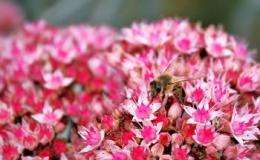Sussex bee scientists question value of neonics ban

The European Commission's two-year moratorium on the use of neonicotinoid insecticides is no "triumph for bee conservation", say University of Sussex bee scientists.
In fact, say Norman Carreck and Professor Francis Ratnieks from the university's Laboratory of Apiculture and Social Insects (LASI), scientific evidence both against and in favour of the ban is "far from clear-cut".
Norman Carreck has been keeping bees for more than 30 years and has been studying bee diseases for more than 20 years. Professor Ratnieks is the UK's only Professor of Apiculture.
Norman Carreck says: "It is not clear what purpose this two-year moratorium will serve, unless it is used to answer some of the outstanding questions."
In April 2013, the European Commission voted on and implemented a two-year moratorium on the use of three neonicotinoid insecticides on "bee attractive crops" following risk assessment reports from the European Food Standards Agency.
Neonicotinoids are a group of systemic insecticides used as a seed dressing for food crops that has been linked with a decline in the numbers of both managed (honey bees) and wild (bumblebees, solitary bees) species.
Professor Ratnieks' and Mr Carreck's review of the research literature and the controversy surrounding neonicotinoids is published today (26 June 2013) in Research Fortnight.
Among the review's observations:
- Bee population declines pre-date neonicotinoids by several decades, so they can't be the sole cause of bee species decline. Declines are more likely due to a complex combination of changes, including agricultural intensification and habitat loss.
- Lab studies point to subtle sub-lethal adverse effects on bee brains, individual bees, or colonies, but so far these effects have not been seen in the field.
- Existing lab and field studies, including those by universities and agencies such as the UK Government's Department of Food and Environment Rural Affairs (Fera) are inconclusive and few in number. The authors comment: "These experiments highlight areas that need attention, particularly the extent of wild bees' exposure to neonicotinoids. But even if governments can be persuaded to fund such work, it will be hard to design a research programme that will answer the question definitively owing to, for example, the fact that there are 250 bee species in the UK alone.
- The neonicotinoids ban means that farmers who grow oilseed rape may well resume frequent insecticide spraying as occurred ten years ago, probably using synthetic pyrethroids. Little is known about the sub-lethal effects of this and other, older pesticides.
The authors conclude: "Many fundamental questions remain unanswered, and may still be so when the moratorium ends. We risk having the same debate in two years' time."
'Will a moratorium on neonicotinoids save the bees?', by Norman Carreck and Francis Ratnieks, will be published in print in Research Fortnight (26 June 2013), and will be freely available online at www.researchresearch.com
Provided by University of Sussex



















